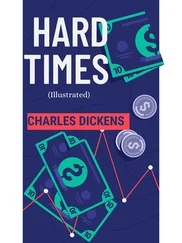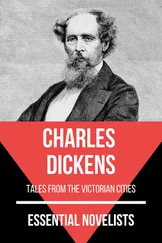Slackbridge jumped up and stood beside him, gnashing and tearing. “Oh, my friends, what but this did I tell you? Oh, my fellowcountrymen, what warning but this did I give you? And how shows this recreant conduct in a man on whom unequal laws are known to have fallen heavy? Oh, you Englishmen, I ask you how does this subornation show in one of yourselves, who is thus consenting to his own undoing and to yours, and to your children's and your children's children's?”
There was some applause, and some crying of Shame upon the man; but the greater part of the audience were quiet. They looked at Stephen's worn face, rendered more pathetic by the homely emotions it evinced; and, in the kindness of their nature, they were more sorry than indignant.
“'Tis this Delegate's trade for t” speak,” said Stephen, “an” he's paid for “t, an” he knows his work. Let him keep to “t. Let him give no heed to what I ha had'n to bear. That's not for him. That's not for nobbody but me.”
There was a propriety, not to say a dignity in these words, that made the hearers yet more quiet and attentive. The same strong voice called out, “Slackbridge, let the man be heern, and howd thee tongue!” Then the place was wonderfully still.
“My brothers,” said Stephen, whose low voice was distinctly heard, “and my fellow-workmen—for that yo are to me, though not, as I knows on, to this delegate here—I ha but a word to sen, and I could sen nommore if I was to speak till Strike o” day. I know weel, aw what's afore me. I know weel that yo aw resolve to ha nommore ado wi” a man who is not wi” yo in this matther. I know weel that if I was a lyin parisht i” th” road, yo'd feel it right to pass me by, as a forrenner and stranger. What I ha getn, I mun mak th” best on.”
“Stephen Blackpool,” said the chairman, rising, “think on “t agen. Think on “t once agen, lad, afore thou'rt shunned by aw owd friends.”
There was an universal murmur to the same effect, though no man articulated a word. Every eye was fixed on Stephen's face. To repent of his determination, would be to take a load from all their minds. He looked around him, and knew that it was so. Not a grain of anger with them was in his heart; he knew them, far below their surface weaknesses and misconceptions, as no one but their fellowlabourer could.
“I ha thowt on “t, above a bit, sir. I simply canna coom in. I mun go th” way as lays afore me. I mun tak my leave o” aw heer.”
He made a sort of reverence to them by holding up his arms, and stood for the moment in that attitude; not speaking until they slowly dropped at his sides.
“Monny's the pleasant word as soom heer has spok'n wi” me; monny's the face I see heer, as I first seen when I were yoong and lighter heart'n than now. I ha” never had no fratch afore, sin ever I were born, wi” any o” my like; Gonnows I ha” none now that's o” my makin”. Yo'll ca” me traitor and that—yo I mean t” say,” addressing Slackbridge, “but “tis easier to ca” than mak” out. So let be.”
He had moved away a pace or two to come down from the platform, when he remembered something he had not said, and returned again.
“Haply,” he said, turning his furrowed face slowly about, that he might as it were individually address the whole audience, those both near and distant; “haply, when this question has been tak'n up and discoosed, there'll be a threat to turn out if I'm let to work among yo. I hope I shall die ere ever such a time cooms, and I shall work solitary among yo unless it cooms—truly, I mun do “t, my friends; not to brave yo, but to live. I ha nobbut work to live by; and wheerever can I go, I who ha worked sin I were no heighth at aw, in Coketown heer? I mak” no complaints o” bein turned to the wa”, o” bein outcasten and overlooken fro this time forrard, but hope I shall be let to work. If there is any right for me at aw, my friends, I think “tis that.”
Not a word was spoken. Not a sound was audible in the building, but the slight rustle of men moving a little apart, all along the centre of the room, to open a means of passing out, to the man with whom they had all bound themselves to renounce companionship. Looking at no one, and going his way with a lowly steadiness upon him that asserted nothing and sought nothing, Old Stephen, with all his troubles on his head, left the scene.
Then Slackbridge, who had kept his oratorical arm extended during the going out, as if he were repressing with infinite solicitude and by a wonderful moral power the vehement passions of the multitude, applied himself to raising their spirits. Had not the Roman Brutus, oh, my British countrymen, condemned his son to death; and had not the Spartan mothers, oh my soon to be victorious friends, driven their flying children on the points of their enemies” swords? Then was it not the sacred duty of the men of Coketown, with forefathers before them, an admiring world in company with them, and a posterity to come after them, to hurl out traitors from the tents they had pitched in a sacred and a God-like cause? The winds of heaven answered Yes; and bore Yes, east, west, north, and south. And consequently three cheers for the United Aggregate Tribunal!
Slackbridge acted as fugleman, and gave the time. The multitude of doubtful faces (a little conscience-stricken) brightened at the sound, and took it up. Private feeling must yield to the common cause. Hurrah! The roof yet vibrated with the cheering, when the assembly dispersed.
Thus easily did Stephen Blackpool fall into the loneliest of lives, the life of solitude among a familiar crowd. The stranger in the land who looks into ten thousand faces for some answering look and never finds it, is in cheering society as compared with him who passes ten averted faces daily, that were once the countenances of friends. Such experience was to be Stephen's now, in every waking moment of his life; at his work, on his way to it and from it, at his door, at his window, everywhere. By general consent, they even avoided that side of the street on which he habitually walked; and left it, of all the working men, to him only.
He had been for many years, a quiet silent man, associating but little with other men, and used to companionship with his own thoughts. He had never known before the strength of the want in his heart for the frequent recognition of a nod, a look, a word; or the immense amount of relief that had been poured into it by drops through such small means. It was even harder than he could have believed possible, to separate in his own conscience his abandonment by all his fellows from a baseless sense of shame and disgrace.
The first four days of his endurance were days so long and heavy, that he began to be appalled by the prospect before him. Not only did he see no Rachael all the time, but he avoided every chance of seeing her; for, although he knew that the prohibition did not yet formally extend to the women working in the factories, he found that some of them with whom he was acquainted were changed to him, and he feared to try others, and dreaded that Rachael might be even singled out from the rest if she were seen in his company. So, he had been quite alone during the four days, and had spoken to no one, when, as he was leaving his work at night, a young man of a very light complexion accosted him in the street.
“Your name's Blackpool , ain't it?” said the young man.
Stephen coloured to find himself with his hat in his hand, in his gratitude for being spoken to, or in the suddenness of it, or both. He made a feint of adjusting the lining, and said, “Yes.”
“You are the Hand they have sent to Coventry , I mean?” said Bitzer, the very light young man in question.
Stephen answered “Yes,” again.
“I supposed so, from their all appearing to keep away from you. Mr. Bounderby wants to speak to you. You know his house, don't you?”
Читать дальше
Конец ознакомительного отрывка
Купить книгу












